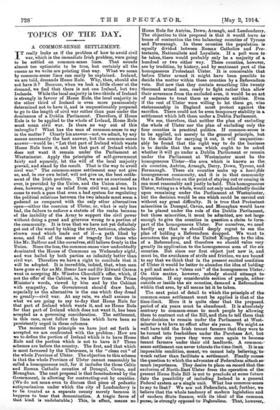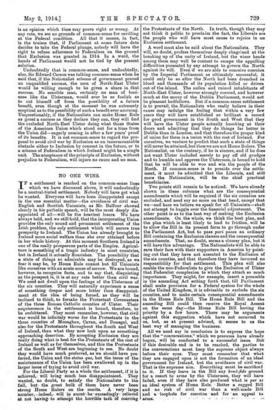TOPICS OF THE DAY.
A COMMON-SENSE SETTLEMENT.
IT really looks as if the problem of bow to avoid civil war, which is the immediate Irish problem, were going to be settled on common-sense lines. That sounds almost too optimistic to be true, but certainly all the omens as we write are pointing that way. What we mean by common-sense lines can easily be explained. Ireland, we are told, demands Home Rule. Why, then, should she not have it ? Because, when we look a little closer at the demand, we find that there is not one Ireland, but two Irelands. While the local majority in two-thirds of Ireland is strongly in favour of Home Rule, the local majority in the other third of Ireland is even more passionately determined not to have it, and is unquestionably prepared to go to the length of civil war rather than pass under the dominance of a Dublin Parliament. Therefore, if Home Rule is to be applied to the whole of Ireland, Home Rule must mean civil war. Is there no way out of this imbroglio ? What has the man of common-sense to say in the matter ? Clearly his answer—not, we admit, by any means necessarily the best answer, but the common-sense answer—would be : "Let that part of Ireland which wants Home Rule have it, and let that part of Ireland which does not want it remain under the Parliament at Westminster. Apply the principles of self-government fairly and squarely, let the will of the local majority prevail, and stand by the result. That is the way to avoid civil war." The common-sense settlement may not give us, and, in our own belief, will not give us, the best settle- ment of the Irish problem. That, we are as convinced as ever, is provided by the Union, and the Union alone. It does, however, give us relief from civil war, and we have come to such a pass that even a bad system for regulating the political relations between the two islands must seem a godseud as compared with the only other alternatives open—either the coercion of Ulster, or, what is only less bad, the failure to enforce a statute of the realm because of the inability of the Army to support the civil power without doing a great and grievous wrong to a portion of the community. It is true that we have not yet definitely got out of the wood by taking the miry, tortuous, obstacle- strewn road which leads out of it—a path liked by none, and full of the sense of tragedy for those who like Mr. Balfour and like ourselves, still believe firmly in the Union. None the less, the common-sense view undoubtedly dominated the House of Commons on Wednesday night, and was hailed by both parties as infinitely better than civil war. Therefore we have a right to conclude that it will be adopted. It is incredible, indeCd, that, when men have gone so far as Mr. Boner Law and Sir-Edward Carson went in accepting Mr. Winston Churchill's offer, which, if not the offer of the Cabinet, is, we know from the Prime Minister's words, viewed by him and by the Cabinet with sympathy, the Government should draw back, especially as the alternative is the one which they dread so greatly—civil war. At any rate, we shall assume in what we are going to say to-day that Home Rule for that part of Ireland which wants it, and no Home Rule for that part of Ireland which does not want it, has been accepted as a governing consideration. The settlement, in this case, must follow the lines which have been so persistently urged in these columns.
The moment the principle we have just set forth is accepted we are confronted with the problem : How are we to define the portion of Ireland which is to have Home Rule and the portion which is not to have it ? Three schemes are before the country. The first, and that which is most favoured by the Ulstermen, is the "clean cut" of the whole. Province of Ulster. The objection to this scheme is that the whole Province of Ulster cannot reasonably be called a homogeneous unit, for it includes the three Celtic and Roman Catholic counties of Donegal, Cavan, and Monaghan. The next proposal is that foreshadowed by the Government, in allowing for contracting-out by counties. (We do not mean even to discuss that piece of pedantic antiquarianism under which the city of Londonderry is to he treated as a separate county merely because it happens to bear that denomination. A tragic farce of that kind is =debatable.) This, in effect, means no
Home Rule for Antrim, Down, Armagh, and Londonderry. The objection to this proposal is that it would leave as bones of contention the two balancing counties of Tyrone and Fermanagh. In these counties the population is equally divided between Roman Catholics and Pro- testants, Nationalists and Loyalists. If a poll were to be taken, there would probably only be a majority of a hundred or two either way. These counties, however, are by tradition, by history, and by sentiment part of the homogeneous Protestant Ulster. It is conceivable that before Ulster armed it might have been possible to decide the matter within these counties by a Referendum vote. But now that they contain something like twenty thousand armed men, ready to fight rather than allow their severance from the excluded area, it would be an act of madness to treat them as separate entities. Even if the rest of Ulster were willing to let them go, wise statesmanship in England must protest against the sacrifice. There could not be even temporary stability in a settlement which left them under a Dublin Parliament.
We see, therefore, that neither the plan of excluding the whole of Ulster nor the plan of excluding only the four counties is practical politics. If common-sense is to be applied, not merely to the general principle, but to the details for carrying it out, it will unquestion- ably be found that the right way to do the business is to decide that the area which ought to be asked whether it will go under a Dublin Parliament or remain under the Parliament at Westminster must be the homogeneous Ulster—the area which is known as the six counties, Antrim, Armagh, Derry, Down, Tyrone, and Fermanagh. These six counties make up a bon' file homogeneous community, and it is in that commuuity that a Referendum on the point of staying out or coming in can most reasonably and justly be held. This homogeneous Ulster, voting as a whole, would not only undoubtedly decide upon remaining under the Parliament at Westminster, but the decision would be one which could be carried out without any great difficulty. It is true that Protestant minorities in Donegal, Cavan, and Monaghan would have to be placed under the rule of the Dublin Parliament, but those minorities, it must be admitted, are not large enough to give the counties in question a claim to form . part of the homogeneous Ulster. For ourselves, we need hardly say that we should deeply regret to see the plan of holding a Referendum dropped. We want to, accustom the people of the United Kingdom to the idea of a Referendum, and therefore we should value very greatly its application to the homogeneous area of the six counties. But since our first object just now is, and must be, the avoidance of strife and friction, we are bound to say that we think that in the present excited condition of Ulster it would be better to abandon the idea of holding a poll and make a "clean cut" of the homogeneous 1.1lster. On this matter, however, nobody should attempt to. dogmatize. If any considerable section of people, either outside or inside the six counties, demand a Referendum within that area, by all means let it be taken.
The next point of detail to which the principle of the. common-sense settlement must be applied is that of the time-limit. Here it is quite clear that the proposed period of six years must be abandoned. It is absolutely contrary to common-sense to mock people by allowing them to contract out of the Bill, and then to tell them that their decision to remain under the Parliament at West- minster is to have no effect after six years. We might as well have told the Irish tenant farmers that they were to be turned into freeholders under the Purchase Act, but that after six years they were once again to become tenant farmers under their old landlords. A common- sense settlement can never tolerate the time-limit. It is an impossible condition, meant, we cannot help believing; to. wreck rather than facilitate a settlement. Finally comes, the question t- which the advocates of Federalism attach AO' much importance. They desire to place on record that the, exclusion of North-East Ulster from the operation of the. present Home Rule Bill is not to preclude at some future date the possibility of including Ireland in a general Federal system as a single unit. What has common-sense to say to that? We are not Federalists, and, further, we believe that the whole tendency of modern legislation and of modern State finance, with its ideal of the common purse; ifretrongly opposed.to. Federalism. That, however,.. is an opinion which time may prove right or wrong. At any rate, we see no grounds of common-sense for cavilling at the Federal condition. All that it means, in fact, is the truism that, if Parliament at some future date decides to take the Federal plunge, nobody will have the right to refuse adherence to Federalism on the ground that Exclusion was granted in 1914. In a word, the hands of Parliament would not be tied by the present solution.
Undoubtedly that is common-sense, and undoubtedly, also, Sir Edward Carson was talking common-sense when he said that, if the Nationalist scheme of government proved an unqualified success, the men of North-East Ulster would be willing enough to be given a share in that success. No sensible man, certainly no man of busi- ness like the Ulsterman, would ever be so foolish as to cut himself off from the possibility of a future benefit, even though at the moment he was extremely sceptical as to the possibility of such a benefit ever accruing. Unquestionably, if the Nationalists can make Home Rule as great a success as they declare they can, they will find the excluded North-East Ulster doing what those States of the American Union which stood out for a time from the Union did—eagerly coming in after a few years' proof of its benefits. It is not common-sense to regard the pro- posal to avoid civil war by Exclusion as an insurmountable obstacle either to Inclusion by consent in the future, or to a scheme of Federalism in which Ireland might be a single unit. The acceptance of the principle of Exclusion, without prejudice to Federalism, will injure no cause and no man.















































 Previous page
Previous page